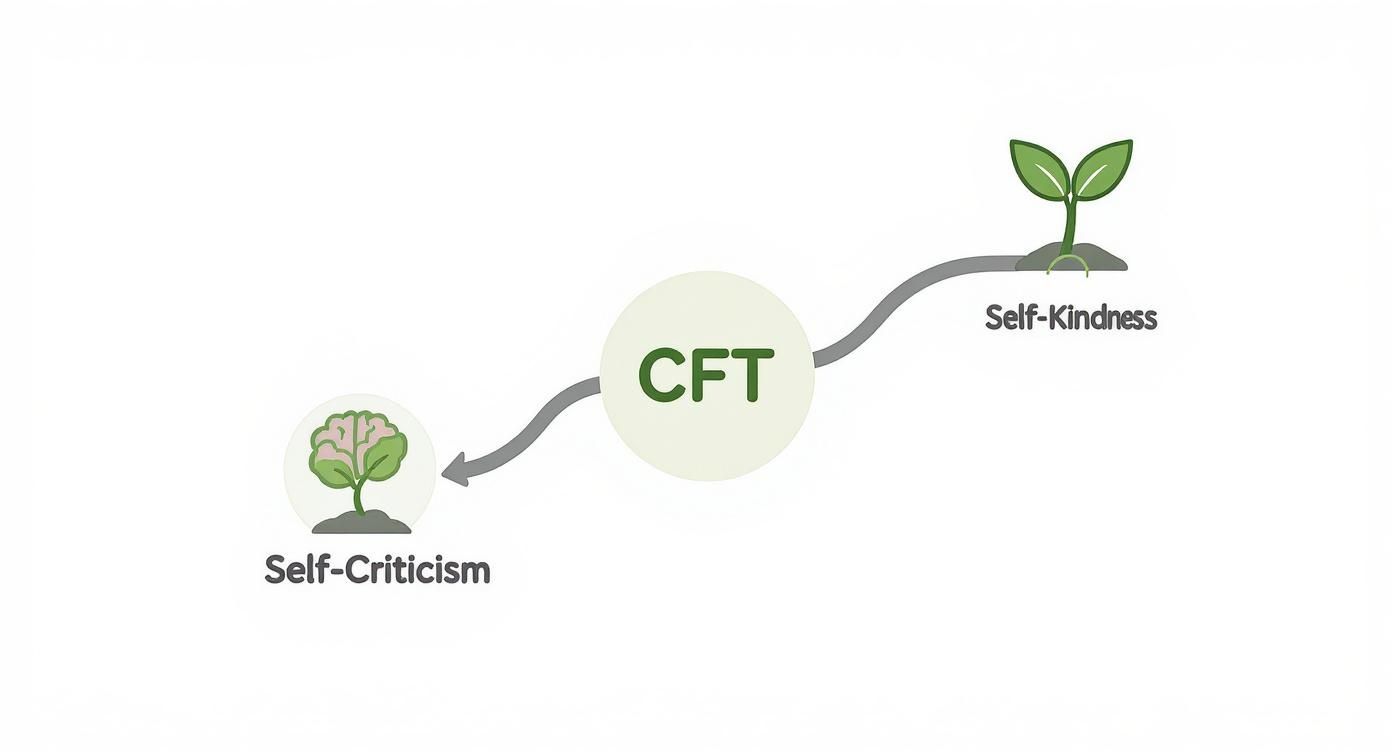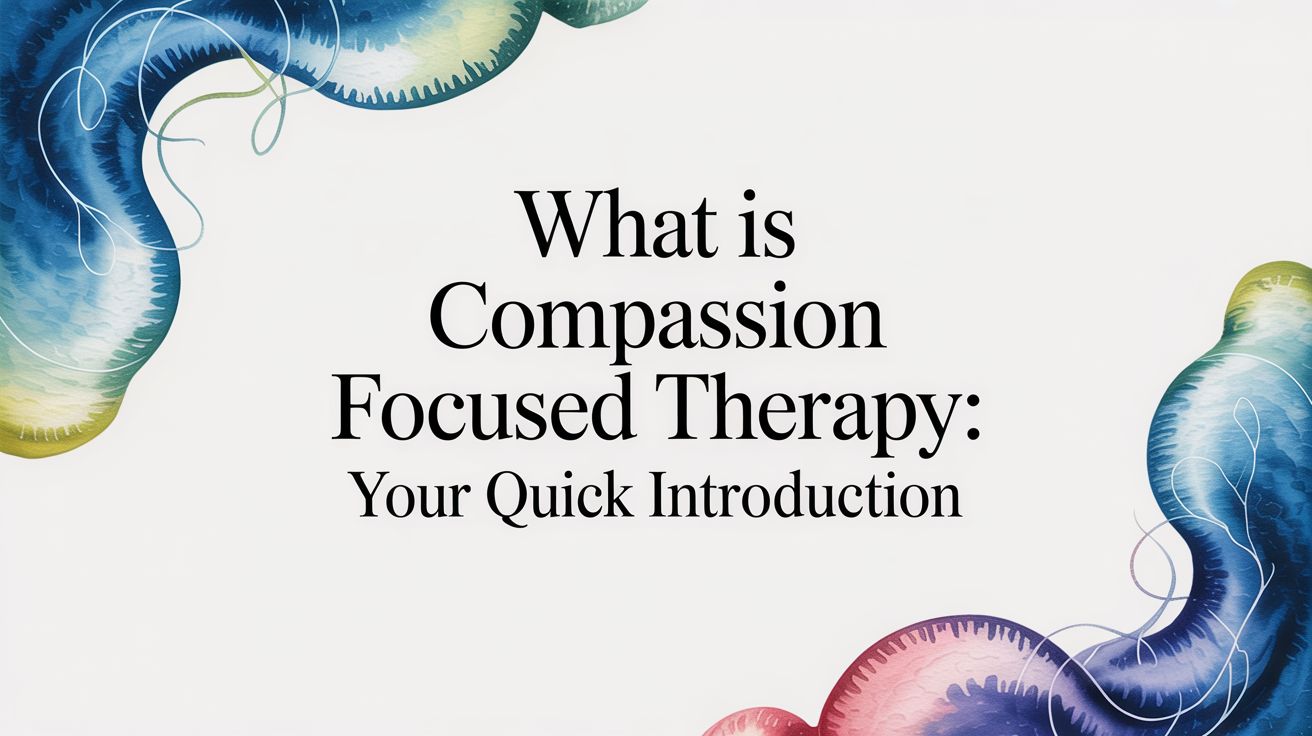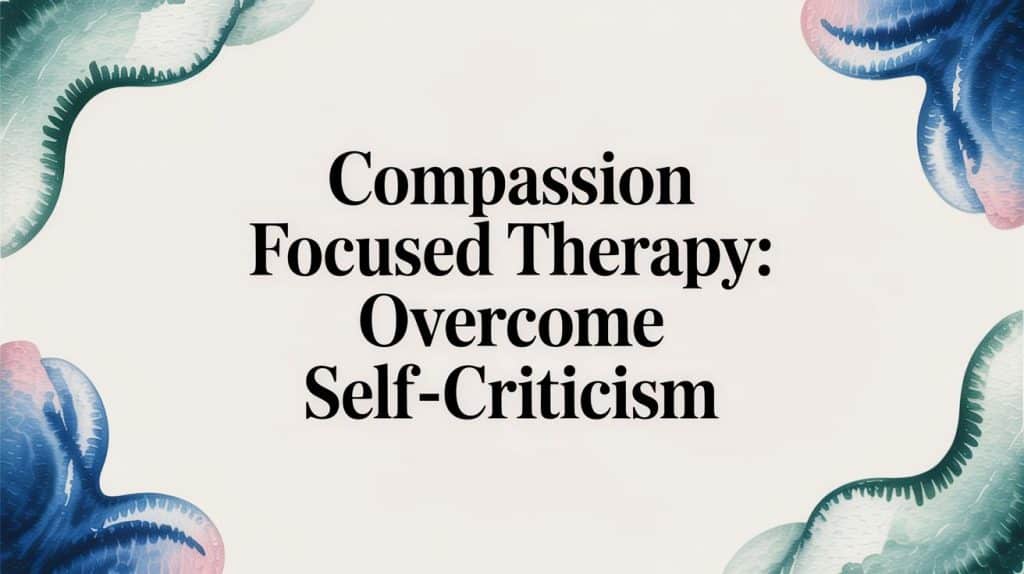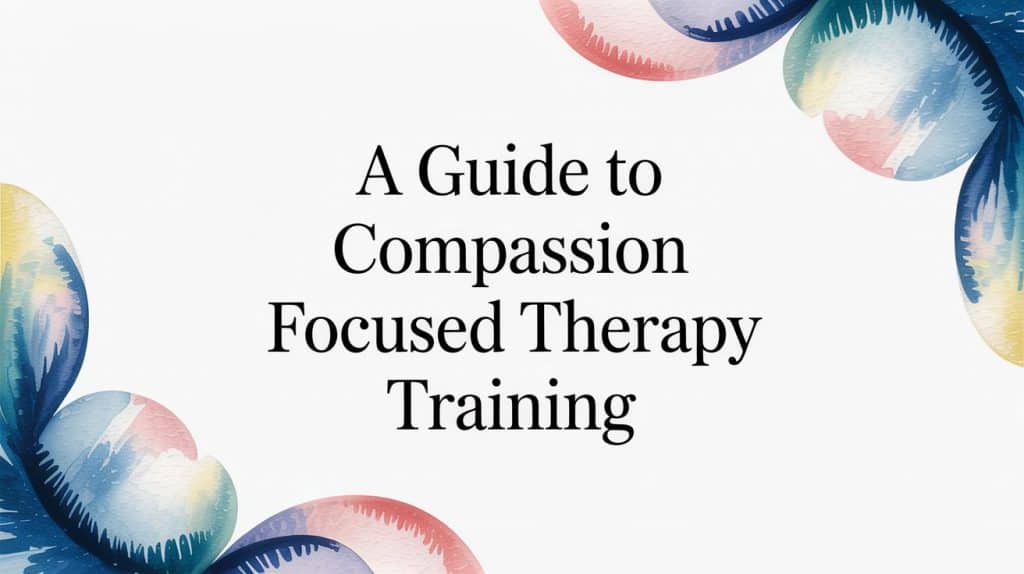Compassion Focused Therapy (CFT) is a way of working with our minds designed for people who find themselves caught in cycles of shame and harsh self-criticism. It was developed by Professor Paul Gilbert to help us build a kinder, more supportive relationship with ourselves.
Think of it as learning to become your own best ally instead of your harshest critic.
What is Compassion Focused Therapy?
Let's use an analogy. Imagine your mind is a garden. Over the years, without you even realising, weeds of self-criticism, doubt, and shame have started to grow, and they can easily choke out feelings of contentment and safety. This isn't your fault. Our brains have some tricky evolutionary wiring that often defaults to self-blame and worry as a way to try and keep us safe.
CFT gives you the tools to gently tend to this inner garden. The idea isn’t to aggressively rip out the weeds, but to learn how to cultivate a completely new kind of inner landscape. This therapy helps you nurture a compassionate part of yourself—one that can offer warmth, strength, and encouragement exactly when you need it most. It’s all about working with your mind, not waging a war against it.
The Big Idea Behind CFT
At its heart, CFT is built on a simple yet profound insight: a lot of our mental health struggles come from having an overactive threat system and an underdeveloped capacity for self-soothing. Many of us are brilliant at picking ourselves apart but find it incredibly difficult to show ourselves the same kindness we’d easily offer a friend in need.
CFT gets right to the heart of this imbalance. It teaches you practical skills to:
- Understand your own brain: You'll learn why your mind churns out self-critical thoughts and how evolution has shaped your emotional world. This is a game-changer for many people.
- Activate your soothing system: You'll develop the ability to calm your own physiology, feel safe, and generate feelings of contentment and kindness from the inside out.
- Build inner warmth: The goal is to cultivate a compassionate inner voice that can guide you through life’s storms with wisdom and genuine support.
This approach is so powerful because it helps you see that things like shame and self-criticism aren't character flaws. They're often old, ingrained survival strategies that, while once helpful, are now causing more harm than good.
The real aim of CFT isn’t to get rid of difficult feelings, but to fundamentally change your relationship with them. It’s about learning to meet your own suffering with courage, wisdom, and a commitment to care, which completely shifts how you navigate emotional pain.
Compassion Focused Therapy has become an important approach within the UK’s mental health landscape, particularly for people struggling with these persistent issues. Its growing use by the NHS, especially within programmes like Improving Access to Psychological Therapies (IAPT), really speaks to its effectiveness. For many, it’s proving to be a powerful way to reduce the burden of shame and self-criticism. You can explore a deeper overview of its role in UK mental health services.
To really get to grips with Compassion Focused Therapy, we first need a map of our inner emotional world. CFT is built on a wonderfully simple but profound idea: our brains have three core systems for managing our feelings.
Think of it like this: our minds have evolved over millions of years, designed for one primary purpose – to survive. But the wiring that helped our ancestors dodge sabre-toothed tigers can sometimes get a bit tangled in the modern world. This often leads to an imbalance, where some of our emotional systems are running on overdrive while others are left to gather dust. A huge amount of our struggles, particularly with that harsh inner critic, comes from this very imbalance.
The Threat System: Our Internal Smoke Alarm
First up is the oldest and most powerful of the bunch: the Threat System. This is our built-in smoke alarm, an ancient mechanism fine-tuned to spot danger and keep us safe. It's the part of you that instinctively jumps back from a speeding car, but it also scans for social threats – things like rejection, criticism, or the fear of not fitting in.
When this system kicks in, it floods our bodies with emotions like anxiety, anger, or shame. It's designed for survival, so it's naturally lightning-fast and tends to hijack everything else. The problem is, in our modern lives, this system can become hyperactive. It starts firing off in response to work deadlines, social media comments, or our own self-critical thoughts, leaving us feeling permanently stressed and on edge.
This is where CFT comes in. It's all about shifting the balance away from the self-criticism fuelled by the Threat System and towards the self-kindness cultivated by another system entirely.

As you can see, CFT gives us the tools to quieten those overactive threat responses and actively nurture a kinder, more supportive inner voice.
The Drive System: Our Inner Engine
Next, we have the Drive System. You can think of this as your inner engine – it’s all about motivation, achievement, and reward. This system is what pushes us to chase our goals, seek out new experiences, and get things done. When your Drive System is humming along, you feel emotions like excitement, vitality, and a sense of purpose.
This system is absolutely essential. It gets us out of bed and helps us build a life. But for many of us, our self-worth gets completely tangled up in it. We can become relentless achievers, always chasing the next promotion or accomplishment, which can easily lead to burnout, comparison, and that nagging feeling of never quite being good enough.
The Soothing System: Our Safe Harbour
Finally, and this is the crucial one for CFT, we have the Soothing System. This part of us is connected to feelings of calm, contentment, and safety. It gets switched on when we feel cared for, connected, and at peace – those moments when we don't feel we have to be on high alert or striving for the next big thing.
The Soothing System is all about our capacity for connection and care, not just for others, but for ourselves too. It helps us feel grounded, safe, and secure from the inside out.
The core problem that Compassion Focused Therapy was designed to solve is this: for many people, the Threat and Drive systems are constantly running on full throttle, while the Soothing System is seriously underdeveloped and neglected. We spend our days worrying and striving, with very little time spent feeling genuinely calm, safe, and content.
Often, this imbalance isn't our fault at all. Difficult life experiences, like a critical upbringing or past traumas, can hardwire our brains to rely on the threat and drive systems just to get by.
The central insight of what is compassion focused therapy is that we can intentionally train our Soothing System, much like you'd train a muscle at the gym. By using specific practices and exercises, we can learn to deliberately activate this system, bringing our emotional world back into a healthier, more sustainable balance. It’s about building a foundation of inner safety and kindness that we can return to, no matter what life throws our way.
The Core Practices: What We Actually Do In CFT
Knowing the theory behind Compassion Focused Therapy is a great start, but the real magic happens when we put it into practice. CFT isn't just a different way to think about your problems; it's a set of skills you actively develop over time, with practical exercises designed to strengthen your soothing system and cultivate a much kinder inner world.
Think of these techniques as a workout for your "compassion muscle." Just like going to the gym builds physical strength, these practices are designed to intentionally build up your capacity for that inner warmth, wisdom, and courage we all need. Let's walk through some of the core exercises that form the heart of CFT.

To help illustrate how these practices fit together, here's a quick overview of the main techniques and what they're designed to achieve.
Key CFT Techniques And Their Purpose
| Technique | Primary Goal | How It Helps |
|---|---|---|
| Compassionate Mind Training | To activate the soothing system. | Uses breathing, posture, and vocal tone to shift the body out of threat mode and into a state of safeness. |
| Compassionate Imagery | To internalise compassionate qualities. | Creates a mental image of a compassionate figure to provide an internal source of strength, wisdom, and non-judgement. |
| Compassionate Letter-Writing | To reframe self-criticism. | Involves writing to yourself from a compassionate perspective to practise a kinder, more understanding inner dialogue. |
Each of these techniques plays a unique role, but they all work toward the same end: building a more supportive and resilient relationship with yourself.
Developing A Compassionate Mind
The very foundation of CFT practice is something we call Compassionate Mind Training. This is really a collection of exercises that directly target your body's physiology to switch on your soothing system. The goal is simple: to help you move out of a state of threat (that feeling of anxiety or stress) and into a state of safety and calm.
One of the first and most fundamental practices is soothing rhythm breathing. This involves intentionally slowing down your breath, making the exhale just a little bit longer than the inhale. It sounds simple, but this action sends a powerful signal to your nervous system that you are safe, helping to lower your heart rate and ease physical tension.
We often combine this with adopting a compassionate posture—sitting upright in a way that feels dignified but relaxed—and using a gentle, warm tone in your self-talk. These physical adjustments aren't just for show; they are direct ways to influence your emotional state and start creating a genuine sense of inner security.
Using Compassionate Imagery
A real cornerstone of CFT is the use of compassionate imagery. This is a powerful exercise where you bring to mind an image of a perfectly compassionate figure or being. This has nothing to do with religion; it's about connecting with the qualities of ideal compassion.
Your compassionate image could be anything that resonates with you:
- An older, wiser version of yourself.
- A figure from a book or film known for their kindness.
- An animal that embodies gentle strength, like an elephant or a lion.
- Even just an abstract sense of warm, coloured light.
The key is to create an image that embodies the qualities you feel you need most—perhaps wisdom, strength, warmth, and a completely non-judgemental presence. You then practise imagining this figure being with you, offering support and understanding, especially when you're struggling. Over time, this helps you internalise these compassionate qualities, making them a part of you.
This practice provides a direct way to receive the kindness and validation you might not have received from others. It’s about creating an internal source of soothing and support that you can turn to whenever you need it, fostering a deep sense of inner safety and care.
Writing With A Compassionate Voice
Another exercise that can be deeply transformative is compassionate letter-writing. This involves writing a letter to yourself about a difficulty you're facing, but doing it from the perspective of your compassionate image or a deeply kind friend.
This isn't about making excuses or letting yourself off the hook. Far from it. Instead, it’s a chance to reframe your experience with genuine understanding and kindness. You can explore how your past, your tricky brain, and your circumstances might have contributed to the situation. The letter would offer you the same validation you'd give to someone you truly care about.
This technique helps you step outside of your usual self-critical habits and actively practise a different, kinder way of relating to yourself. It helps you see that developing self-compassion is the key to emotional well-being and resilience, giving you a concrete tool to build that strength. With consistent practice, these techniques start to rewire your automatic responses, gradually replacing the voice of your inner critic with an inner ally who is wise, strong, and always on your side.
While the ideas behind building a kinder inner world can benefit pretty much anyone, Compassion Focused Therapy offers specific, powerful relief for people caught in some particularly painful emotional traps. Think of it as an antidote for a mind that has become a harsh, unforgiving, and frankly exhausting place to live. If you feel like you're constantly fighting a relentless inner critic, this approach could be a game-changer.
CFT is designed for those who know the sting of deep-seated shame—that gut-wrenching feeling that there’s something fundamentally wrong with you. It’s also incredibly effective for people dealing with the after-effects of trauma, abuse, or neglect. These experiences can hardwire our brains for threat, making self-criticism feel like a default survival strategy.
Individuals Prone to High Self-Criticism and Shame
At its heart, CFT directly takes on the vicious cycle of self-attack. It's a perfect fit for anyone who finds themselves trapped in loops of harsh self-judgement, no matter how much they might achieve on the outside.
This often shows up as:
- A constant inner bully: An internal voice that is quick to point out flaws, magnify mistakes, and tell you how you don't measure up to others.
- Feelings of worthlessness: A nagging, persistent sense that you aren't good enough, lovable enough, or capable enough, even when the evidence says otherwise.
- Difficulty accepting kindness: Struggling to really let in compliments or care from others because, deep down, you don't feel you deserve it.
If these patterns feel all too familiar, CFT provides a clear path to understanding and softening that inner critic. It helps you explore where your shame and self-criticism came from—not as character flaws, but as understandable (though painful) protective strategies your mind developed along the way. To dive deeper into this, you can explore our guide on how compassion focused therapy can help you heal from shame and self-criticism.
CFT isn’t about trying to get rid of your inner critic. It’s about cultivating a compassionate self that is strong enough, wise enough, and warm enough to stand up to it. This new inner voice becomes your greatest ally, offering support right when the critic’s voice gets loud.
Support for Common Mental Health Challenges
Beyond its laser focus on shame and self-criticism, CFT has also proven to be a powerful ally for a range of common mental health difficulties we see every day in the UK. Its emphasis on regulating our threat system makes it a brilliant approach for managing anxiety and depression, where endless worry and low mood are often fuelled by self-blame.
The therapy has also been adapted to support individuals with eating disorders, where the relationship with one's self and body is so often fraught with criticism. What’s more, CFT offers a unique way to approach chronic pain. In the UK, where this condition affects around 28 million people, CFT provides tools to change one's relationship to physical suffering.
A UK-based evaluation of virtual CFT groups for pain management found that participants not only improved their mental health and self-compassion but did so with no dropouts, highlighting just how accessible it can be for those with long-term conditions. You can read more about the findings of this CFT service evaluation.
In short, if your struggles are made worse by a harsh, unforgiving relationship with yourself, CFT offers a targeted, evidence-based path toward building a more supportive and resilient inner world.
What To Expect From Your CFT Sessions
The idea of starting therapy can be a bit daunting, but knowing what the process looks like can make it feel far more approachable. A journey with Compassion Focused Therapy (CFT) is a collaborative and deeply supportive experience, designed to help you build a kinder relationship with yourself, one step at a time.

The whole thing is grounded in a warm, non-judgemental therapeutic relationship. Your therapist isn’t there to judge you; think of them more as a guide. They’re there to help you understand your own mind and cultivate your inner compassionate self with genuine care and support.
Your First Steps: The Initial Assessment
The first few sessions are all about getting on the same page. You and your therapist will gently explore your personal history, the struggles you're facing now, and the specific ways your self-criticism shows up.
This isn’t about digging up the past for the sake of it. It’s about understanding how your life experiences have shaped your mind and the protective strategies it’s learned along the way. This phase is crucial for tailoring the therapy specifically to you, helping you set meaningful goals and map out a clear, hopeful path forward.
Learning The Foundations: Psychoeducation
A big part of CFT is learning why your brain does what it does. Your therapist will walk you through the model of the three emotional systems—threat, drive, and soothing. This part is incredibly empowering for many people because it helps you realise that your self-critical thoughts and difficult feelings are not your fault.
Understanding the evolutionary wiring of your brain can be a huge relief. It reframes self-criticism not as a personal failing, but as an overactive threat system trying its best to keep you safe—even if its methods are now causing you pain. This knowledge is the first step toward changing your relationship with it.
This "psychoeducation" piece gives you the "what" and the "why" behind your struggles, which perfectly sets the stage for learning the "how" of cultivating compassion.
Building Your Skills: Active Practice
This is where the theory becomes a real, felt experience. The core of your sessions will involve learning and practising the key techniques of CFT. Your therapist will guide you through exercises right there in the room, such as:
- Compassionate Mind Training: Learning practical skills like soothing rhythm breathing to activate your body’s natural calming system.
- Imagery Exercises: Working to develop your own compassionate image—an internal source of strength, wisdom, and encouragement you can turn to.
- Compassionate Letter-Writing: Practising how to talk to yourself with kindness and understanding, especially when you're going through a tough time.
You’ll practise these skills both in session and at home, gradually building your "compassion muscle" over time. It's a steady process of building a new, more supportive inner world.
This approach has proven its worth across many different challenges. In the UK, for instance, CFT has been adapted for perinatal mental health. Studies found that new mothers in Perinatal CFT groups saw significant drops in self-criticism and the programme had a 75% retention rate. You can read more about these promising outcomes for perinatal women on Frontiers.
Finding A CFT Therapist In The UK
Deciding to begin Compassion Focused Therapy is a profound act of kindness to yourself. If you feel ready to start this journey, finding the right person to guide you is the crucial first step. The good news is, there are some excellent, trustworthy resources here in the UK to help you connect with a qualified professional.
A brilliant place to start is the Compassionate Mind Foundation, the very organisation set up by Professor Paul Gilbert. Their website is often the best port of call for finding therapists who have completed specific, in-depth training in the CFT model. This gives you confidence that you’re connecting with someone who really gets the approach inside and out.
On top of that, it's always wise to check a therapist's credentials with the main professional bodies.
Checking Professional Registrations
Whenever you're looking for a therapist in the UK, it’s vital to make sure they're registered with a recognised professional organisation. It’s a layer of safety and accountability that’s there to protect you.
You’ll want to look for therapists who are members of one of these main bodies:
- The British Association for Counselling and Psychotherapy (BACP): One of the largest professional bodies for counsellors and psychotherapists in the UK.
- The UK Council for Psychotherapy (UKCP): This council holds a national register of psychotherapists and psychotherapeutic counsellors.
Being registered with organisations like these means the therapist has to meet high standards for their training, ongoing professional development, and ethical practice. Most therapists specialising in CFT will be registered with one of them.
Finding the right fit is about more than just qualifications; it's about connection. A good therapeutic relationship is built on a sense of safety and trust, so don’t hesitate to have an initial chat with a few therapists to see who you feel most comfortable with.
If you’re looking for more tailored support, it can be really helpful to seek out a specialist. Many experienced practitioners offer dedicated CFT therapy sessions both online and in person, creating a focused and expert space for your journey.
And if you’re not quite ready for one-to-one therapy yet? There are some fantastic self-help resources out there. Reading books by Professor Paul Gilbert, like The Compassionate Mind, is a wonderful way to get to grips with the core ideas and start practising some of the exercises on your own.
Of course. Here is the rewritten section, adopting the specified human-written, expert tone and style.
Your CFT Questions, Answered
As you start to get your head around Compassion Focused Therapy, it’s only natural for questions to bubble up. CFT is deeply intuitive, but it can feel like a world away from some of the other therapies you might have come across. So, let’s clear up a few of the most common queries I hear, giving you a better feel for how it all works in practice.
One of the big ones is how CFT stacks up against more well-known therapies.
How Is CFT Different From CBT?
This is a great question. Cognitive Behavioural Therapy (CBT) and CFT actually come from the same scientific family tree, but they have a distinctly different focus.
Think of it this way: CBT is often about challenging and changing the content of your thoughts. It’s brilliant at giving you the tools to catch a negative thought, hold it up to the light, question if it’s really true, and swap it for a more balanced one.
CFT, on the other hand, isn’t so much about battling the thought itself. It’s more interested in changing your relationship to it. Instead of arguing with a harsh inner voice, you learn how to meet it with kindness, understanding, and a sense of wisdom. The whole emotional climate of your inner world begins to shift, helping to soothe your threat system rather than trying to out-think it.
How Long Does CFT Usually Take?
I get asked this a lot. Unlike some highly structured, short-term approaches, CFT doesn’t come with a fixed number of sessions. The length of your journey is shaped entirely by you – your needs, your history, and what you want to achieve.
Because we’re working to build new neural pathways for compassion and self-soothing, this work often goes deeper and requires a bit more time. It’s not about finding a quick fix; it’s about fundamentally rewiring your relationship with yourself for change that genuinely lasts. Some people feel a significant shift in a few months, while others find real benefit from staying with the process for longer to let these new skills truly take root.
The goal here isn't just to reduce symptoms. It’s about cultivating an inner compassionate self that can support you for the rest of your life. This process of deep, internal change is given the time and space it needs to flourish.
Isn't Self-Compassion Just Letting Yourself Off The Hook?
This is such a crucial point and a very common worry. A lot of people, especially those who live with a powerful inner critic, fear that being compassionate with themselves is just a form of weakness, an excuse for not trying hard enough.
The reality couldn’t be more different.
Self-compassion isn't about ducking responsibility; it’s about taking responsibility with kindness and courage. Imagine the difference between a harsh coach who screams at you for dropping the ball, and a wise coach who says, "Okay, that didn't work. Let's figure out why and see how we can do better next time." Which one is actually going to help you improve? The compassionate approach gives you the emotional safety you need to look at your mistakes and learn from them, without being completely crushed by shame. It's the foundation for genuine growth.
At Dr Chris Irons, we specialise in helping individuals and professionals use the power of Compassion Focused Therapy to build resilience and overcome self-criticism. If you're ready to cultivate a kinder inner world, explore our therapy, coaching, and training services.
Article created using Outrank


